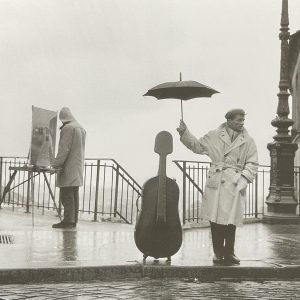Decades ago, I discovered this evocative photograph, Un musicien sous la pluie (Musician in the Rain) by Robert Doisneau. Taken in Paris in 1957, to me it is the embodiment, heart and soul, of a musician in love with the whole artform. It also represents the harsh practical reality of a musician’s life – the quality of the instrument might just determine the next pay cheque and meal on the table.

Before I considered myself a singer, I called myself a pianist and a flautist. I understood that I was learning on affordable instruments that were within the means of my family. Even now, I still dream of being able to own a Steinway grand piano, an instrument on which I find dexterity and joy – but I doubt I ever will since their average price (new) is $75,000-$130,000. I did upgrade my flute from a student model to a ‘grown up’ model and that was around $2000. Even a student cello (the instrument in this photo) won’t give you much change out of $1000. And we won’t even start on the cost of the audio equipment we use!
So…what price would you put on your voice if you could go into a shop and buy it?
The value of the chemicals that it is comprised of?
The value of your years invested in lessons, rehearsal and performance?
The accumulated time spent listening to other singers and rehearsing in your bedroom with your hairbrush?
How do you evaluate such immeasurable treasures as personality, genetics, physical health, listening skills, favourite genres, role models and mentors?
Short answer…you can’t. There are no larynx transplants or replacements available. No new model in the shop window ready for you to get an upgrade.
And even if there were…how would you get it to fully resemble YOU? The magnificent unique vocal instrument that is YOU – recognisable to your loved ones and adored by your fans.
“For those of us who sing, we are the power source, the vibrator and the resonator of our musical instrument, playable only by its owner without ever seeing it. It requires no limbs to play. It not only has tone but can form words and express emotions, ideas, stories and poetry. It is a living, growing, changing instrument.”
Karen Brunssen
SO….where am I going with this? Well, I have a really important question for you…
Do you take care of your vocal instrument in the same way that you would if you’d spent $75,000 on it?
An obvious flow on question is – do you know what your voice needs to be in good working order? And how to provide those needs for your voice?
When working well and cared for, your vocal instrument is:
- Hydrated – when the body has had enough fluids, a watery mucus is released into the larynx to keep the soft tissue moist
- Free – buoyant and energised body alignment will ensure freedom in the larynx and other singing muscles
- Flexible and vibrant – adequate warming up of the entire vocal range strengthens and elasticises the vocal fold muscles
- Holistic – health of the larynx is supported by wellbeing and personal care of all other body systems
- Confident – optimal vocal function is a byproduct of a confident and prepared mind
I invite you to ponder the following questions so that you can make good choices for your priceless voice. Take your time, grab your journal and a cup of tea…this is worth answering honestly.
- Do you think of yourself as a musical instrument at all?
- Do you think of yourself as a musical instrument 24/7?
- Do you value yourself as a musical instrument and think you’re worth taking care of?
- What can you do to take better care of your voice in the coming week?
- What will you do today – right now! – to start taking better care of your voice?
I have written heaps of blogs about some of the physical and psychological aspects of vocal health and voice care, so here’s some extra reading if you’re interested…
What questions does this blog raise for you? I’d love to help you discover the answers you need – so send me a message via [email protected] and let’s go exploring.
If you enjoyed these tips and ideas, why not sign up for the Glengrove Studio newsletter.
To subscribe, click here or click on the NEWSLETTER SIGN-UP button at the top of this webpage.
Sources
Brunssen, K. (2018). The Evolving Singing Voice: Changes Across the Lifespan. Plural Publishing, San Diego
Hall, K. (2014). So You Want to Sing Music Theater. Rowman & Littlefield, Maryland, U.S.
Photo by Lina Trochez on Unsplash
Photo by Robert Doisneau, Un musician sous la pluie (Paris, 1957)
Wilson, P. W. (2013). The Singing Voice: An Owner’s Manual (Second Ed.) Lazy O’Rhinus Press, Sydney.